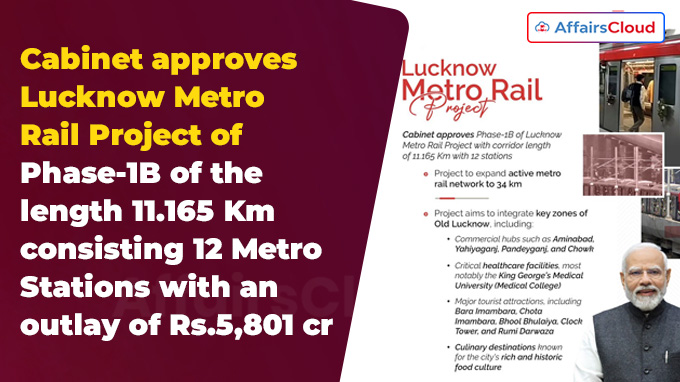 On August 12, 2025, the Union Cabinet chaired by Prime Minister (PM) Narendra Modi approved the following proposals:
On August 12, 2025, the Union Cabinet chaired by Prime Minister (PM) Narendra Modi approved the following proposals:
- Approves the implementation of the Phase-1B of the Lucknow Metro Rail Project in Uttar Pradesh (UP) with an outlay of Rs. 5801 crores.
- The Cabinet Committee on Economic Affairs (CCEA) approved an investment of Rs. 8,146.21 crores for the Tato-II Hydro Electric Project in Shi Yomi District, Arunachal Pradesh (AR).
Exam Hints:
- Event: Union Cabinet approved the proposals
- Approval 1: Implementation of the Phase-1B of the Lucknow Metro Rail Project in UP
- Coverage: 11.165 km with 12 stations
- Outlay: Rs. 5,801 crores
- Approval 2: 700 MW Tato-II Hydro Electric Project in Shi Yomi district, AR
- Energy production: 2738.06 million Units
- Implementing Agencies: NEEPCO (Shillong, Meghalaya) + Government of AR
- Outlay: Rs. 8,146.21 crores
Lucknow Metro Rail Project of Phase-1B:
Approval: The Union Cabinet approved Phase-1B of the Lucknow Metro Rail Project in Lucknow, UP, covering 11.165 kilometres(km) with 12 stations of 7 underground and 5 elevated.
Outlay: The total project outlay is Rs. 5,801 crores. Upon completion, the city will have an active metro rail network of 34 km.
Enhanced Connectivity:
Phase-1B will connect densely populated and historically significant areas lacking efficient transport links, including:
Commercial hubs: Aminabad, Yahiyaganj, Pandeyganj, Chowk
Healthcare facilities: King George’s Medical University (Medical College)
Tourist attractions: Bara Imambara, Chota Imambara, Bhool Bhulaiya, Clock Tower, Rumi Darwaza
Culinary destinations: Culinary hotspots renowned for Lucknow’s heritage cuisine
Benefits:
Traffic Decongestion: The metro will provide an efficient alternative to road transport, will decongest Old Lucknow’s busiest routes and reduce travel time.
Environmental Impact: Shift from road/fossil-fuel transport to metro is expected to reduce carbon emissions.
Economic Growth: Enhanced connectivity to airports, railway stations, and bus depots will stimulate local business activities and attract investments.
Social Impact: Improved access to essential services and equitable public transport options for all socio-economic groups.
700 MW Tato-II Hydro Electric Project in Shi Yomi District of AR:
Approval:The CCEA approved an investment of Rs. 8,146.21 crore for the Tato-II Hydro Electric Project (HEP) in Shi Yomi district, AR.
- The project is expected to be completed in 72 months.
Project Specifications:
Installed Capacity: 700 MW (4 x 175 MW)
Annual Energy Generation: 2,738.06 million Units (MU)
Implementing Agency: Joint Venture(JV) between North Eastern Electric Power Corporation Limited (NEEPCO) and the Government of AR.
Financial Support:
Budgetary Support: Rs. 458.79 crore for construction of roads, bridges, transmission lines.
Central Financial Assistance: Rs. 436.13 crore towards equity share of the state government.
Benefits:
State Revenue: 1% for the Local Area Development Fund (LADF) and 12% free power to the state
Infrastructure Development: Construction of 32.88 km of roads and bridges, along with hospitals, schools, marketplaces, and playgrounds funded from Rs. 20 crore dedicated project funds.
Employment: Direct and indirect jobs for local workers, benefiting Micro, Small, and Medium Enterprises (MSMEs).
National Grid Balancing: The project will strengthen power supply in AR and contribute to national energy stability.
- Supports domestic industries and local suppliers aligning with Aatmanirbhar Bharat Abhiyan
Recent Related News:
In July 2025, the Union Cabinet approved the Research Development and Innovation (RDI) scheme with a corpus of Rs.1 lakh crore, with an aim to bolster India’s research and innovation ecosystem.
- The RDI scheme aims to provide long-term financing or refinancing with long tenors at low or nil interest rates to increase private sector investment in RDI




